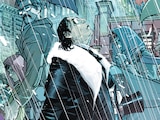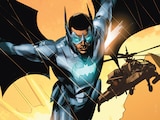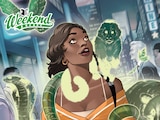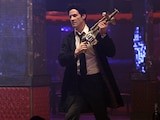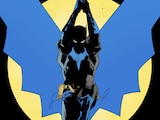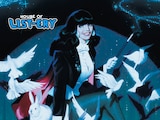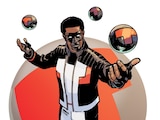It's likely that you're familiar with Arthur Curry, a.k.a. Aquaman, as the character's been a pop culture icon since his first appearance in More Fun Comics #73 in 1941. Recently, Jason Momoa stepped into the gold and green armor in 2018's Aquaman. However, he wasn’t the first actor to do it! Although Momoa's Aquaman is the first live-action version to gain real traction, Arthur did try to make waves on the small screen in a 2006 pilot for The WB Television Network, developed by the creators of Smallville.
Both versions have more than a few redeeming qualities, but let's take a look at who comes out on top in the Ring of Fire challenge between Aquaman (2006) and Aquaman (2018)!

Voiceover
Beginning at the...well, beginning, both the TV pilot and the movie start out with voiceovers which talk about the world and Arthur's place in it. No offense to Daniella Deutscher (née Wolters), who plays Atlanna in the TV pilot, but I'd rather listen to Momoa warn me of the dangers to come. (I'd rather listen to him read the phone book, to be honest, but that's not part of this battle.)
Victor: Aquaman (2018). I mean...Jason Momoa.

Family Life and Early Years
In the pilot, Arthur "AC" Curry (played by Justin Hartley) is the—spoiler alert—actual, full-blooded prince of Atlantis, and his human father is actually his adopted father. His real name is Orin, and he and his mother were secreted away from Atlantis by an advisor named McCaffery to keep them from getting killed. AC grew up not knowing anything about his past or where he came from, but he was aware of his skills in the water and a "strange empathy" toward sea life.
In the movie, Arthur's half-human/half-Atlantean, which causes him a whole lot of issues when he first tries to wrest the crown from his half-brother (and full-blooded Atlantean) King Orm. Unlike AC, this Arthur knew the truth about his mother and was trained from a young age by a royal advisor, Vulko.
Victor: Aquaman (2006). There's nothing wrong with either of their upbringings, but being the full-blooded prince might have made things easier for AC, in the long run. The "half-breed" moniker really set Arthur back. (And c'mon, Atlanteans. Don't be so prejudiced.)

Mother's Disappearance
In both the pilot and the movie, Arthur's mother has to leave him when he's quite young. In the TV show, the plane Atlanna's piloting goes down in a freak storm over the Bermuda Triangle and a creature drags her down into the depths of the ocean after she entreats AC to get to the surface. In the movie, Atlanna is forced to return home for the safety of her son and Tom Curry, but not before she completely wrecks house (both figuratively and literally) when a contingent of Atlantean soldiers come looking for her.
Victor: Aquaman (2018). Watching Nicole Kidman absolutely slay those soldiers was such a fist-pumping moment.

Looks
You'll have to excuse me for getting superficial here for a moment, but Aquaman is a property that often features fit dudes going around shirtless or wearing suits of armor that leave little to the imagination, muscle-wise. Neither the pilot nor the movie were exceptions to that rule.
Hartley obviously did a lot of training to get in shape for the role of AC, and with his blond hair and lithe physique, his AC definitely wins in the "who looks more like the comic character" contest. And if you asked me in 2006 whose looks I preferred, I probably would have named Hartley. (What can I say? I grew up on the WB's shows.) But—and again, excuse the superficiality—Momoa is, well, Momoa. Those tattoos! Those sun(-in) highlighted locks! Those biceps! That gravelly voice that can be both scary and sensuous! Momoa looks the part of a superhero and carries himself like one too.
Victor: Aquaman (2018). I don't really have to explain this one, do I?

Teacher
In the movie, Arthur grew up training under the tutelage of Vulko, who was a vizier in the Atlantean royal court and an extremely skilled fighter. His training allows Arthur to be able to hold his own against Orm and eventually defeat him. In the pilot, AC got no training whatsoever, but the promise of training to come—from another royal advisor, McCaffery—was expressly stated at the end of the episode and likely was going to be a part of the larger series.
Victor: Aquaman (2006). I love me some Willem Dafoe, but Ving Rhames gave AC Shakespeare's Henry IV, parts 1 and 2, to read as his first task. Hit me right in my Bard-loving heart.

Love Interest
We don't get to learn who the actual love interest of the TV series would have been, but there were two female characters in the pilot who had promise: AC's business partner Eva and Lt. Rachel Torres, who AC saves when her fighter jet goes down while she's patrolling over the Bermuda Triangle. Eva seems nice, and I hope she was going to be a regular in the series (she's hurt at the end of the show, and I'm guessing it could have gone either way), but I was already shipping AC and Lt. Torres after their flirty scene in the hospital. (She also had an intriguing backstory that I would have loved to watch unfold.)
The movie stuck with the source material, introducing Y'Mera Xebella Challa—Mera—into Arthur's life. She's a skilled fighter in her own right and is the voice of reason when Arthur's unsure of what he's supposed to do. She's his equal in more ways than one, and an impressive superhero in her own right.
Victor: Aquaman (2018). Mera might be betrothed to Orm, but she's got a mind—and ideals—all her own. Plus, her water-bending skills are savage!

Villain
Whereas Arthur battled his half-brother and Black Manta, who were out for world domination and vengeance, respectively, AC battled a vicious siren named Nadia who was looking to drag him back to Atlantis to face execution.
Victor: Tie. The movie villains had more time to be fleshed out and their motivations made a lot of sense, but I do love a good monster of the week story. And the practical and special effects to turn Adrienne Palicki into a monster were surprisingly good for the time period!

Weapon
Arthur starts the movie wielding his mother's weapon, a five-pronged trident that can do some major damage. And he ends the movie battling with a three-pronged trident forged for the greatest king Atlantis has ever seen, long thought to be merely a myth, like his namesake’s Excalibur.
AC stabs Nadia in the head with a vaguely trident-shaped harpoon that's not even three feet long and kind of looks like a BBQ fork.
Victor: Aquaman (2018). That little harpoon fork thing AC uses to kill Nadia can't hold a candle to King Atlan's trident.

Ending Song
Because it was a WB show in the early aughts, the pilot ends with an angsty TRUSTcompany song called "Downfall." The movie, on the other hand, ends with a more up-beat number by Skyler Grey called "Everything I Need." Both songs do a good job of speaking to the themes of the story, with lyrics like "You can't see / What I see / The other side of me / Fall back on me / And I'll be the strength I need" ("Downfall") and "Born on the wrong side of the ocean / With all the tides against you / You never thought you'd be much good for anyone / But that's so far from the truth" ("Everything I Need").
Victor: Aquaman (2006). Although "Downfall" is very stereotypically 2006, it seems to be more about AC finding the strength he needs inside himself, while "Everything I Need" is about someone (Mera?) finding what she needs in Arthur. The former feels more applicable to the plot and who Aquaman is.

Winner: Aquaman (2018)
Although the winner here is the movie, it wasn't as much of a rout as Arthur and Orm's final battle, and the pilot and the movie actually have much more in common than I might have expected. In the end, and no matter who "won," they're both about a man finding his place in the world and discovering that there's more to himself than he ever knew—and I'm not just talking about superpowers.
Mandy Curtis writes about comics, specifically DC’s Young Adult line, and TV for DCComics.com. Look for more of her writing on Forever Young Adult and find her on Twitter at @mandyannecurtis.

